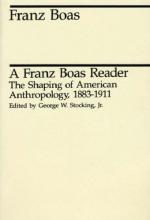|
This section contains 6,927 words (approx. 24 pages at 300 words per page) |

|
SOURCE: An Introduction to The Ethnography of Franz Boas, edited by Ronald P. Rohner, translated by Hedy Parker, The University of Chicago Press, 1969, pp. xiii-xxx.
In the following excerpt, the critics describe Boas's approach to the study of human societies and place him in the context of nineteenth-century ethnographic theories.
Even today, a quarter of a century after his death, Franz Uri Boas remains one of the most controversial figures in the history of anthropology. Anthropologists have tended to take a categorical stance approaching adulation or condemnation regarding the value of his work. In 1943, for example, Benedict rhapsodized, "He found anthropology a collection of wild guesses and a happy hunting ground for the romantic lover of primitive things; he left it a discipline in which theories could be tested." [Leslie] White on the other hand, recently charged that "Boas came fairly close to leaving the 'chaos of beliefs...
|
This section contains 6,927 words (approx. 24 pages at 300 words per page) |

|


